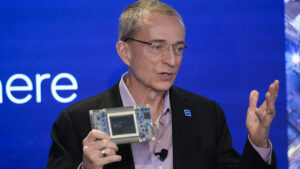Pat Gelsinger Intel CEO ousted after company’s poor performance, board said resign or be fired

After Intel fell behind Nvidia and TSMC’s competitors, the company’s board reportedly gave the CEO two options: resign or be removed.

In Short
- Intel CEO Pat Gelsinger resigned after the board lost confidence in his strategy.
- Gelsinger was given a choice to retire or be removed; he chose retirement.
- CFO David Zinsner and EVP Michelle Johnston Holthaus named interim co-CEOs
Intel CEO Pat Gelsinger resigned on December 1. The board, reportedly frustrated, forced him to step down due to the company’s prolonged struggles to keep up with competitors like Nvidia and TSMC. According to a Bloomberg report, the board lost confidence in Gelsinger’s strategy to revive the struggling chipmaker. Gelsinger’s ousting is a significant leadership change at one of the world’s leading technology companies.
The decision came after last week’s tense board meeting, where Gelsinger outlined Intel’s plans to regain market share and compete with rivals such as Nvidia. Sources cited in the report revealed that Gelsinger was given two choices: announce his retirement or face removal. He opted to retire, bringing his tenure at Intel to an end.
In the interim, CFO David Zinsner and EVP Michelle Johnston Holthaus have been appointed as co-CEOs while the board seeks a permanent successor. Additionally, Frank Yeary, the independent chair of the board, will temporarily serve as executive chair. Intel’s leadership team has focused on stabilising operations and rebuilding investor trust.
Intel faces significant challenges in the growing field of artificial intelligence (AI) computing, a market where Nvidia has established dominance. Once seen as a niche player, Nvidia has turned its graphics chips into indispensable tools for AI and data centres, earning its place as the world’s most valuable publicly traded semiconductor company. In contrast, Intel’s efforts to establish a foothold in this profitable sector have yet to progress substantially.
In a statement, Pat Gelsinger shared his mixed feelings about stepping down. “Today is bittersweet, as this company has been my life for the bulk of my working career,” he said. While acknowledging the past year’s difficulties, he defended the challenging decisions made to align the company with market demands.
“While we have made significant progress in regaining manufacturing competitiveness and building the capabilities to be a world-class foundry, we know that we have much more work to do at the company and are committed to restoring investor confidence,” board member Frank Yeary said.
Gelsinger’s departure could signal significant shifts in Intel’s strategy as it strives to regain its standing in the semiconductor industry. The company faces increasing pressure to innovate and address the needs of a rapidly changing market.




